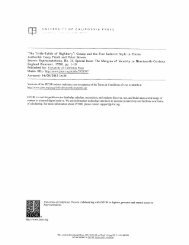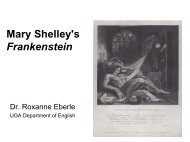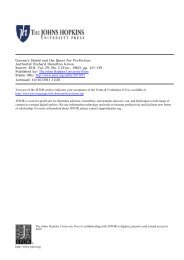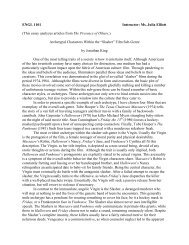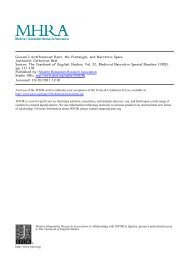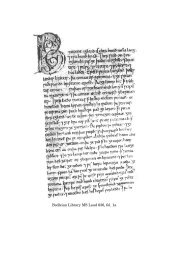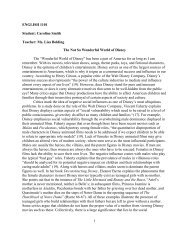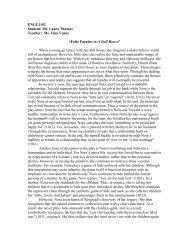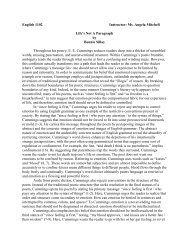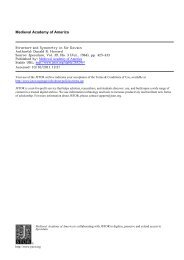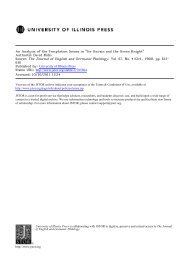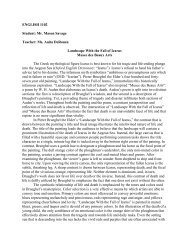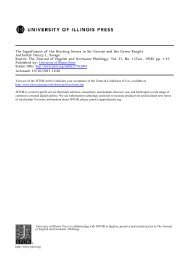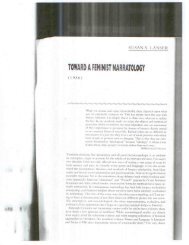Spivak and Parry Notes
Spivak and Parry Notes
Spivak and Parry Notes
You also want an ePaper? Increase the reach of your titles
YUMPU automatically turns print PDFs into web optimized ePapers that Google loves.
separately from the putative “author” – the text emerges out of a set of<br />
social, political, <strong>and</strong> aesthetic forces that the author “channels” more than<br />
“controls”<br />
<strong>Spivak</strong> is explicitly uninterested in the author’s intention; she is interested in the text’s<br />
“usefulness” in exploring the dynamics of individualism <strong>and</strong> imperialism (810-811)<br />
<strong>Spivak</strong> reads the novel as a type of re-writing of The Tempest only here the<br />
“Other” (the Creature/Caliban) refuses to be “selfed” (as Safie has been or<br />
Antoinette in Wide Sargasso Sea); he cannot be brought under the law [<strong>and</strong> we<br />
can tell here, that <strong>Spivak</strong> is rooting for the Creature – she celebrates his<br />
refusal to be brought under the rule of law]<br />
in a persuasive reading of the novel’s conclusion, <strong>Spivak</strong> argues that (in fact) the<br />
Creature’s fate remains utterly unknown – “lost in darkness <strong>and</strong> distance”<br />
further supported by the fact that we don’t have evidence of Margaret Saville (the<br />
ideal English female subject) receiving the letters – the frame is open (268)<br />
In a revised version of this essay, <strong>Spivak</strong> reads these texts as “supplements” of each<br />
other because each contains what the other lacks; her refusal to treat the intentionality<br />
of the author as well as her use of the term “supplement” reveals yet another critical<br />
dimension to her work ; a postcolonial feminist, she draws upon deconstruction as<br />
well<br />
Benita <strong>Parry</strong>, [Two Native Voices in Wide Sargasso Sea] (from “Problems in<br />
Current Theories of Colonial Discourse” pub. 1987)<br />
Takes explicit issue with <strong>Spivak</strong>’s deconstructionist response to identity, particularly at<br />
the end of the excerpt:<br />
<strong>Spivak</strong>’s deliberated deafness to the native voice where it is to be heard, is at<br />
variance with her acute hearing of the unsaid in modes of Western feminist<br />
thought . . . in her own writings [she] severely restricts (eliminates?) the space in<br />
which the colonized can be written back into history, even when ‘interventionist’<br />
possibilities’ are exploited through the deconstructive strategies devised by the<br />
post-colonial intellectual. (250)<br />
Antoinette must (in <strong>Spivak</strong>’s articulation) be sacrificed to Jane’s “subjectconstitution”<br />
<strong>and</strong> Christophine cannot be heard at all<br />
In only recognizing Antoinette as playing “the part of the woman from the colonies”<br />
who is silenced <strong>and</strong> “unselved,” <strong>Spivak</strong> (according to <strong>Parry</strong>) misses the opportunity<br />
to hear Christophine, a “native” agent



